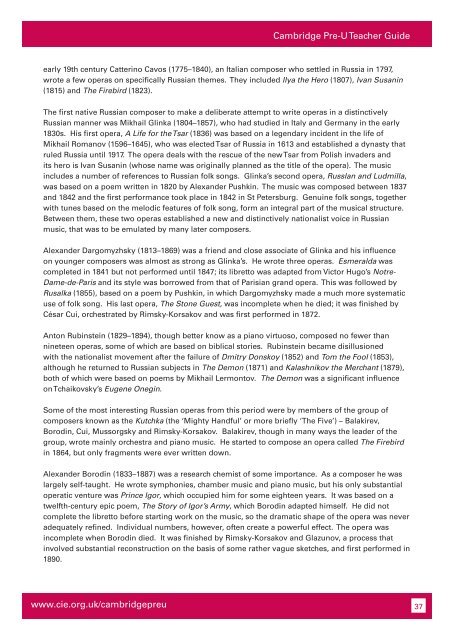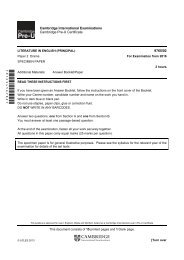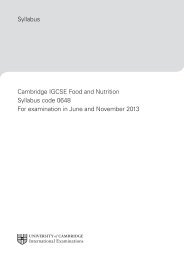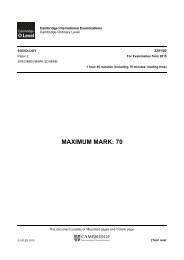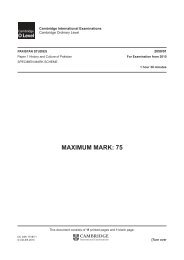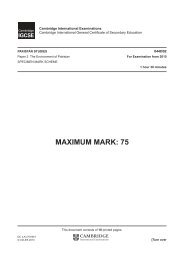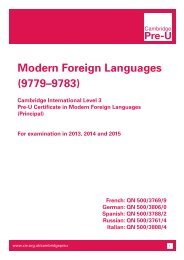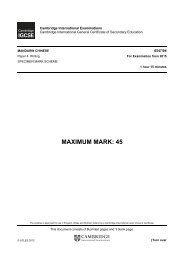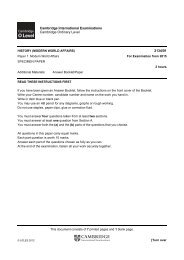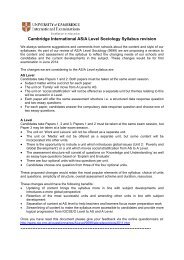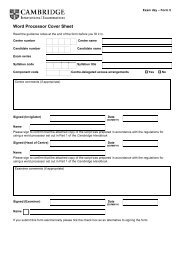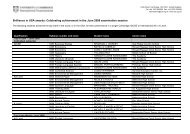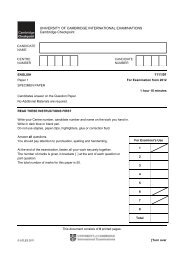Teacher's Guide Cambridge Pre-U MUSIC Available for teaching ...
Teacher's Guide Cambridge Pre-U MUSIC Available for teaching ...
Teacher's Guide Cambridge Pre-U MUSIC Available for teaching ...
Create successful ePaper yourself
Turn your PDF publications into a flip-book with our unique Google optimized e-Paper software.
<strong>Cambridge</strong> <strong>Pre</strong>-U Teacher <strong>Guide</strong><br />
early 19th century Catterino Cavos (1775–1840), an Italian composer who settled in Russia in 1797,<br />
wrote a few operas on specifically Russian themes. They included Ilya the Hero (1807), Ivan Susanin<br />
(1815) and The Firebird (1823).<br />
The first native Russian composer to make a deliberate attempt to write operas in a distinctively<br />
Russian manner was Mikhail Glinka (1804–1857), who had studied in Italy and Germany in the early<br />
1830s. His first opera, A Life <strong>for</strong> the Tsar (1836) was based on a legendary incident in the life of<br />
Mikhail Romanov (1596–1645), who was elected Tsar of Russia in 1613 and established a dynasty that<br />
ruled Russia until 1917. The opera deals with the rescue of the new Tsar from Polish invaders and<br />
its hero is Ivan Susanin (whose name was originally planned as the title of the opera). The music<br />
includes a number of references to Russian folk songs. Glinka’s second opera, Russlan and Ludmilla,<br />
was based on a poem written in 1820 by Alexander Pushkin. The music was composed between 1837<br />
and 1842 and the first per<strong>for</strong>mance took place in 1842 in St Petersburg. Genuine folk songs, together<br />
with tunes based on the melodic features of folk song, <strong>for</strong>m an integral part of the musical structure.<br />
Between them, these two operas established a new and distinctively nationalist voice in Russian<br />
music, that was to be emulated by many later composers.<br />
Alexander Dargomyzhsky (1813–1869) was a friend and close associate of Glinka and his influence<br />
on younger composers was almost as strong as Glinka’s. He wrote three operas. Esmeralda was<br />
completed in 1841 but not per<strong>for</strong>med until 1847; its libretto was adapted from Victor Hugo’s Notre-<br />
Dame-de-Paris and its style was borrowed from that of Parisian grand opera. This was followed by<br />
Rusalka (1855), based on a poem by Pushkin, in which Dargomyzhsky made a much more systematic<br />
use of folk song. His last opera, The Stone Guest, was incomplete when he died; it was finished by<br />
César Cui, orchestrated by Rimsky-Korsakov and was first per<strong>for</strong>med in 1872.<br />
Anton Rubinstein (1829–1894), though better know as a piano virtuoso, composed no fewer than<br />
nineteen operas, some of which are based on biblical stories. Rubinstein became disillusioned<br />
with the nationalist movement after the failure of Dmitry Donskoy (1852) and Tom the Fool (1853),<br />
although he returned to Russian subjects in The Demon (1871) and Kalashnikov the Merchant (1879),<br />
both of which were based on poems by Mikhail Lermontov. The Demon was a significant influence<br />
on Tchaikovsky’s Eugene Onegin.<br />
Some of the most interesting Russian operas from this period were by members of the group of<br />
composers known as the Kutchka (the ‘Mighty Handful’ or more briefly ‘The Five’) – Balakirev,<br />
Borodin, Cui, Mussorgsky and Rimsky-Korsakov. Balakirev, though in many ways the leader of the<br />
group, wrote mainly orchestra and piano music. He started to compose an opera called The Firebird<br />
in 1864, but only fragments were ever written down.<br />
Alexander Borodin (1833–1887) was a research chemist of some importance. As a composer he was<br />
largely self-taught. He wrote symphonies, chamber music and piano music, but his only substantial<br />
operatic venture was Prince Igor, which occupied him <strong>for</strong> some eighteen years. It was based on a<br />
twelfth-century epic poem, The Story of Igor’s Army, which Borodin adapted himself. He did not<br />
complete the libretto be<strong>for</strong>e starting work on the music, so the dramatic shape of the opera was never<br />
adequately refined. Individual numbers, however, often create a powerful effect. The opera was<br />
incomplete when Borodin died. It was finished by Rimsky-Korsakov and Glazunov, a process that<br />
involved substantial reconstruction on the basis of some rather vague sketches, and first per<strong>for</strong>med in<br />
1890.<br />
www.cie.org.uk/cambridgepreu 37


